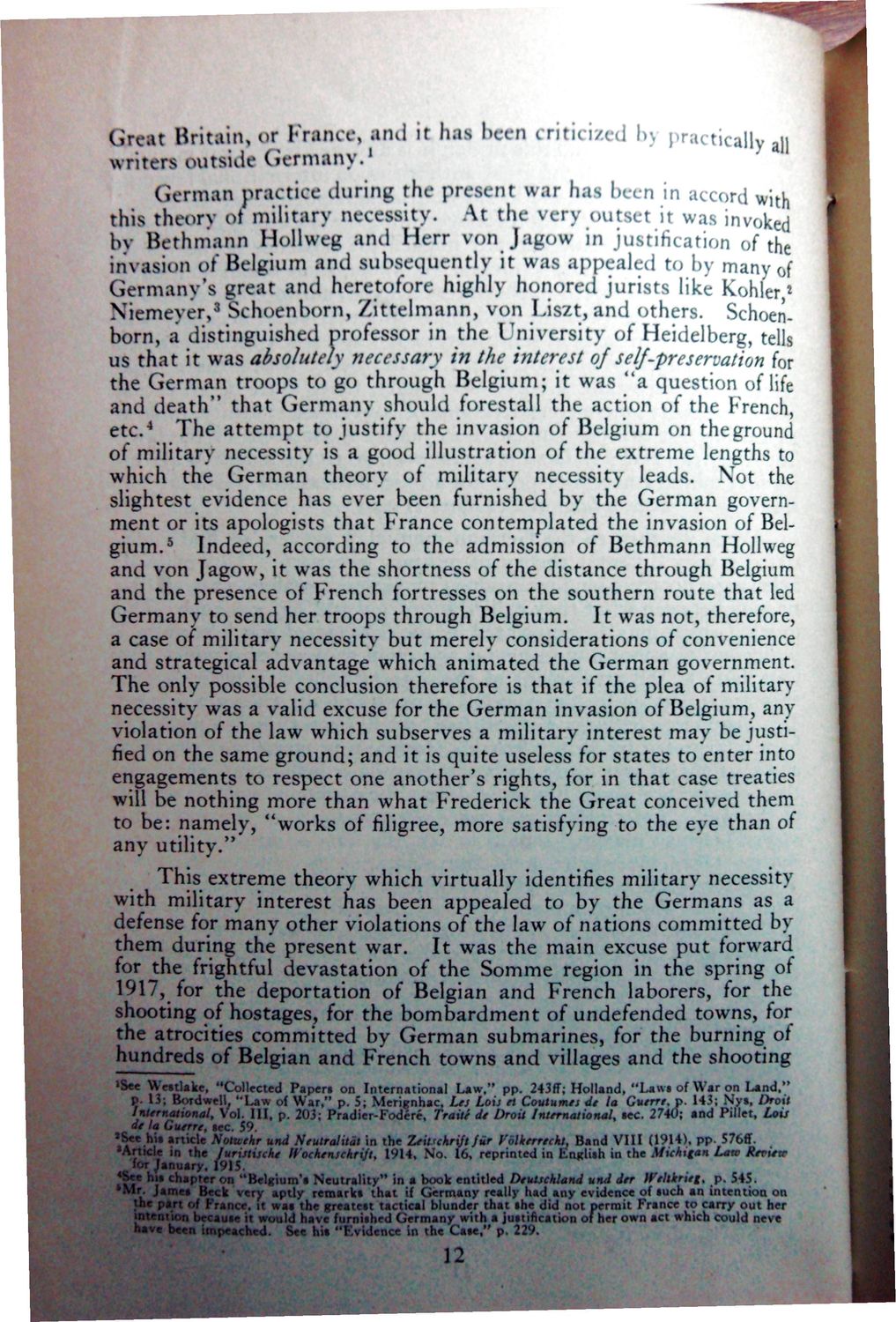| |
| |
Caption: War Publications - WWI Compilation 1923 - Article 14
This is a reduced-resolution page image for fast online browsing.

EXTRACTED TEXT FROM PAGE:
Great Britain, or Franco, ami it has h in criticized l>> practically «]] 1 writers outside Germany. German practice during the present war has k e n in accord with this theory of military necessity. At the very outset it was invoked by Bethmann Hollweg and Herr von Jagow in justification of the invasion of Belgium and subsequently it was appealed to by many 0f 2 Germany's great and heretofore highly honored jurists like Kohler, 3 Niemeyer, Schoenborn, Zittelmann, von Liszt, and others. Schoenborn, a distinguished professor in the University of Heidelberg, tells us that it was absolutely necessary in the interest of self-preservation for the German troops to go through Belgium; it was "a question of life 0 and death that Germany should forestall the action of the French, 4 etc. The attempt to justify the invasion of Belgium on theground of military necessity is a good illustration of the extreme lengths to which the German theory of military necessity leads. Xot the slightest evidence has ever been furnished by the German government or its apologists that France contemplated the invasion of Bel5 gium. Indeed, according to the admission of Bethmann Hollweg and von Jagow, it was the shortness of the distance through Belgium and the presence of French fortresses on the southern route that led Germany to send her troops through Belgium. It was not, therefore, a case of militarv necessitv but merelv considerations of convenience and strategical advantage which animated the German government. The only possible conclusion therefore is that if the plea of military necessity was a valid excuse for the German invasion of Belgium, any violation of the law which subserves a military interest may be justified on the same ground; and it is quite useless for states to enter into engagements to respect one another's rights, for in that case treaties will be nothing more than what Frederick the Great conceived them to be: namely, "works of filigree, more satisfying to the eye than of any utility/' This extreme theory which virtually identifies military necessity with military interest has been appealed to by the Germans as a defense for many other violations of the law of nations committed by them during the present war. I t was the main excuse put forward for the frightful devastation of the Somme region in the spring of 1917, for the deportation of Belgian and French laborers, for the shooting of hostages, for the bombardment of undefended towns, for the atrocities committed by German submarines, for the burning of hundreds of Belgian and French towns and villages and the shooting >See Westlakc, "Collected Papert on International Law." pp. 243ff; Holland, "Laws of War on Land," P. 13; Bordwell. "Law of War," p. 5; Merignhac, Les Lois et Coutumes de la Guerre,p. 143; Nyt, Droit International, Vol. Ill, p. 203; Pradier-Fodere, Traite de Droii International, tec. 2740; and Pillet, Lois de la Guerre, sec. 59. •See hit article Notwehr und Neutralitat in the Zeitsckrift fur Vblkerreckt, Band VIII (1914). pp. 576ff. ^Article in the Juristic he Wochenschrijt, 1914, No. 16, reprinted in English in the Michigan Law Review tor January. 191 > 4 Sre hit chapter ,v"Belgium's Neutrality" in a book entitled Deutschland und der Weltkrieg, p. 545. mc cry £ ** * '' I * aptly rcmarkt that if Germany really had any evidence of tuch an intention on the part of France, if wat the greatest tactical blunder that the did not permit France to carry out her intention becaute it would have furnished Germany with a justification of her own act which could neve have been impeached. See his "1 lence in the Case." p. 229. 12
| |